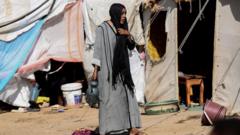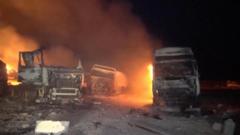The bombing, involving helicopter gunships and drones, targeted a hospital in Old Fangak, the only medical facility in Fangak county, leading to widespread destruction and injury. The humanitarian crisis deepens amid escalating tensions between the country's leaders.
Tragic Bombings in South Sudan's Fangak County Claim Seven Lives

Tragic Bombings in South Sudan's Fangak County Claim Seven Lives
A devastating bombing of a hospital and market in South Sudan has resulted in the deaths of at least seven individuals and raised concerns of a looming civil war.
At least seven people lost their lives after a grave incident involving the bombing of a hospital and a market in South Sudan, according to reports from the charity Doctors Without Borders (MSF). The attack occurred in Old Fangak, located in Jonglei state, where it has heightened fears about the potential for a return to civil war in the nation. MSF reported that helicopter gunships dropped a bomb on the pharmacy of their hospital, which was then set ablaze as ground fire continued for nearly half an hour. Further devastation unfolded when a drone targeted a local market, also causing injury to approximately 20 individuals.
The hospital is the sole medical facility serving Fangak county, which is home to over 110,000 residents. With all medical supplies now destroyed, MSF condemned the bombing as a "clear violation of international humanitarian law." Nicholas Haysom, the head of the United Nations mission in South Sudan, has expressed concerns that the country is precariously close to a full-scale civil war. Rising tensions between President Salva Kiir and Vice-President Riek Machar are exacerbating these fears.
Just hours before the bombing, army chief Paul Majok Nang had announced plans for military action following the hijacking of several river barges. He accused a militia linked to Machar of orchestrating the attacks, although Machar has yet to respond to these claims. Machar and several associates were arrested in March for allegedly inciting rebellion, fueling suspicions of another ethnic conflict brewing in South Sudan.
Since gaining independence from Sudan in 2011, South Sudan has been through significant turmoil. Two years later, a civil war ignited after President Kiir dismissed Machar, accusing him of plotting against the government. The ensuing conflict, largely based on ethnic divisions between the leaders’ factions, led to approximately 400,000 deaths and displaced 2.5 million citizens.
A peace deal was brokered in 2018, resulting in the establishment of a unity government yet no elections have taken place as required. Essential terms of the peace agreement, which included the dissolution of militias and the formation of a united army, remain largely unmet. The White Army militia, previously allied with Machar, recently engaged in clashes with the government's forces, escalating the region's instability. Human rights organizations are now calling for an end to military assaults on civilian areas, pressing for immediate action to protect the vulnerable population of South Sudan.





















